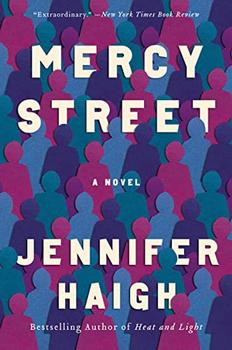Summary | Excerpt | Reviews | Beyond the Book | Readalikes | Genres & Themes | Author Bio

A Novel
by Jennifer Haigh
"No," said Claudia.
"I didn't think so," the aunt said.
In truth, she had never decided not to have children. She had simply decided, not now—at twenty, at thirty, at forty. At every point in her life, there had been something else she'd rather do.
The aunt said, "I don't know how you can work here."
Claudia said nothing. People were always telling her this: old friends, distant cousins, strangers on airplanes. Her dentist. Her chiropractor. The woman who cut her hair. Her therapist had pointed out that a reply was unnecessary; it was a statement, not a question. The most obvious response was simple agreement. No, you don't.
"Vanessa will be fine." Claudia handed the aunt a card. "That's my direct number. If she needs anything, please call."
I DON'T KNOW HOW YOU CAN WORK HERE.
Here's what Claudia didn't say, had never said: I didn't always. Long ago, in another life, she'd lived in New York and worked at a magazine called Damsel.
She got the job because she was young and cute and her boyfriend's mother knew someone. Claudia was hired as an assistant editor, the youngest on the masthead. It was her first lesson in how the world worked.
Damsel dispensed an unending stream of advice. They taught women how to be women. Service journalism, they called it.
Once a year, Claudia wrote without irony, book a session with a professional bra fitter.
It was a glamour job. The paycheck was small, but there were other compensations. Damsel paid for her gym membership, a monthly clothing allowance to cover dry cleaning. Enterprising salon owners offered free haircuts and massages and waxing and pedicures, hoping for a positive mention in the magazine.
When did bra fitting become a profession? Was there a licensing exam, an International Sisterhood of Bra Fitters, an annual convention to keep yes, abreast, of new developments in bra technology?
Color-treated hair demands TLC, Claudia wrote. A violet shampoo will tone down brassiness.
She wrote about breakthroughs in anti-aging skincare, fashion mistakes over forty. She was twenty-three years old.
A glamour job, highly coveted. The assistant editors skipped lunch to save money, and spent the hour smoking on the rooftop. In the evenings they went to events. An event was a cocktail party, a salon opening, a product launch: the spring line, a celebrity diet book. The assistant editors arrived en masse, crammed into taxis to protect their borrowed shoes. They sipped wine from plastic goblets. They made a meal of the free hors d'oeuvres.
Investment shoes, smuggled out of the photo department: stiletto heels worn only once, by a model for a cover shoot.
The fashion mistake, it seemed, was turning forty.
It was a time in her life when no one ever said, I don't know how you can work here.
The great unspoken irony of that job, which strikes her even today, was that a person raised in a trailer could be hired to do it. Not that she trumpeted this fact about herself, then or ever. At twenty-three, she was like a gangster in the Program. Discretion was the central imperative of her life.
She was good at the job, to the extent anyone could be. Her heds and deks were clever, her ledes witty. Her qualifications were the same as anyone's: she had been raised a girl. As a child she'd pinned diapers on a doll that wet itself. She dressed Barbie in bikinis and evening gowns, matched tiny plastic handbags to tiny plastic shoes.
The dolls taught you what you were supposed to want.
The dolls loomed large in her memory. As a child she'd preferred Barbie to the other type, the chubby baby doll, with its nifty faux-urination feature. Claudia's was a hand-me-down from an older cousin, and she never quite knew what to do with it. (You changed its diaper and then what? Carried it around with you?)
Excerpted from Mercy Street by Jennifer Haigh. Copyright © 2022 by Jennifer Haigh. Excerpted by permission of Ecco. All rights reserved. No part of this excerpt may be reproduced or reprinted without permission in writing from the publisher.
Your guide toexceptional books
BookBrowse seeks out and recommends the best in contemporary fiction and nonfiction—books that not only engage and entertain but also deepen our understanding of ourselves and the world around us.